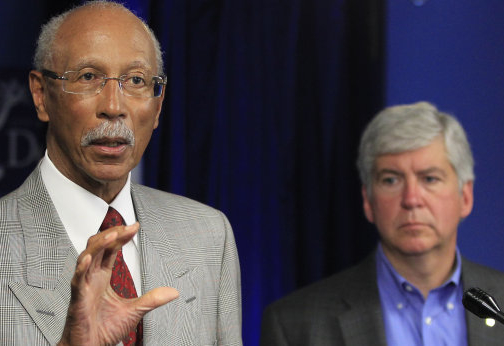
A challenge to Michigan’s emergency- manager law, which allows the state to take over the finances of fiscally-troubled cities, must appear on the Nov. 6 ballot, the state’s supreme court ruled.
The Michigan Supreme Court today ordered the state’s board of canvassers to put the repeal of the rule before state voters. The board earlier rejected petitions for a vote because papers filed by the law’s opponents didn’t use the right size type.
“A majority of this court holds that plaintiff is entitled to a new writ of mandamus requiring the Board of State Canvassers to certify its petition as sufficient,” Justice Mary Beth Kelly wrote.
The Michigan law, signed by Governor Rick Snyder last year, gives emergency managers the right to terminate employee contracts and suspend collective bargaining. Opponents contend the law is anti-democratic and lets unelected officials rule over local governments.
The 2011 law will be suspended after the state board certifies the election petitions. The effect of this suspension is in dispute and will probably trigger additional court battles, according to lawyers on both sides.
Detroit’s Agreement
Opponents of the law have said the suspension should cover Detroit’s agreement with the state over city finances even though it was reached before an emergency manager was appointed.
“Because the consent agreement was pushed down the throats of the city of Detroit, the agreement should be invalidated,” said Julie Hurwitz, attorney for Stand Up for Democracy, which opposes the law. “The state’s going to resist that. This will go to the courts,” she said.
The ruling will block further actions by already-appointed emergency managers over cities or school boards, said William Goodman, another attorney for Stand up for Democracy.
“Any action taken will be extralegal,” he said in an interview.
A prior law allowing emergency managers should cover those appointed to oversee cities including Benton Harbor and Pontiac, said John Pirich, attorney for Citizens for Fiscal Responsibility, which supports the 2011 measure.
“The 1990 act would be reinstated,” Pirich said. “It’s not the same act, but we’ve had emergency managers since 1990.”
Interim Effect
The 1990 law will “govern in the interim” between the suspension and the election, Michigan Attorney General Bill Schuette said in a statement before the Supreme Court ruled. The 2011 law remains in effect until state election officials certify the petitions from opponents, Schuette said.
The ballot initiative was rejected by Michigan’s board of state canvassers because the signature forms didn’t comply with a legal requirement that petition headings had to be in 14-point type.
Stand Up for Democracy appealed the decision, contending the variance was minor, that the petition was in “substantial compliance” and its rejection would thwart the will of Michigan citizens. The Michigan Court of Appeals ordered the board to place the measure on the ballot, finding that the petitions complied substantially with the heading type-size requirement.
The 2011 law gave the state “considerably more power” to take over the financial affairs of a city or other municipality or school board, said Hurwitz.
“The emergency manager becomes essentially a dictator, with unilateral power to invalidate contracts, to sell property, to literally run the government,” she said.
The case is Stand Up for Democracy v. Board of State Canvassers, 145387, Michigan Supreme Court (Lansing).